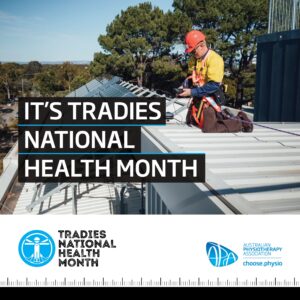Tradies National Health Month
12th August 2021
by The Australian Physiotherapy Association
August is Tradies National Health Month and the focus is on you. Your back. Your shoulders. Your knees. And let’s not forget the muscles you use day in, day out. Research1 revealed 60% of tradies often have aches and pains as a result of their job.
Aussie tradies make up 35 per cent of the Australian workforce, yet they account for a staggering 59 per cent in serious claims for worker’s compensation, according to statistics from Safe Work Australia.
The responsibility for workplace health and safety sits with employers. Your workers are your most important assets, so it’s vital you ensure they have access to the best health and safety advice available.
Physiotherapists provide expert advice, specialist treatment, tailored exercises and so much more. The Australian Physiotherapy Association has put together the following tips to assist with better health outcomes for tradies.
Why is tradie health so important?
Physically demanding trade jobs can cause and exacerbate a range of injures. It’s not surprising that tradies are overrepresented in workplace statistics compared to other workers. The average time off work due to serious workplace injury is 5-6 weeks, which is time many tradies simply can’t afford.
To help reverse these statistics, we need to take a good look at the workplace culture and practices of many tradies and encourage them to focus more on their health and safety. Quite simply, tradies rely on their bodies for work—their bodies are their primary work tool. If it breaks down or becomes incapacitated through injury or chronic illness, they can’t work to their full ability.
How can I look after myself better at work?
Given the physical nature of a tradie’s work, it’s important that you go home safe, well and ready for action again the next day. To help you do this, follow a few simple steps:
What is the most common injury?
Back pain is the most common injury experienced by tradies, as it is the part of the body involved in almost all the tasks that tradies undertake at work. Other common injuries for tradies include:
How do I reduce the risk of getting injured at work?
Most injuries to tradies occur as a result of ignoring pain and niggles, rushing at work, improvising with tools or equipment or being distracted by everyday tasks. Tradies can follow a few simple steps to help reduce the chance of injury:
Many tradies have to complete jobs that require either repetitive bending or awkward positions, so flexibility is really important to trades people. Improving flexibility requires regular stretching. Here are some great ones to try:
Click here to find your nearest physio. You can find out more about Tradies Health Month here.
^Tradies Health Survey 2019 – prepared by Empirica Research for the Australian Physiotherapy Association

Comments posted to this page are moderated for suitability. Once your comment has been checked it will be uploaded to the site.